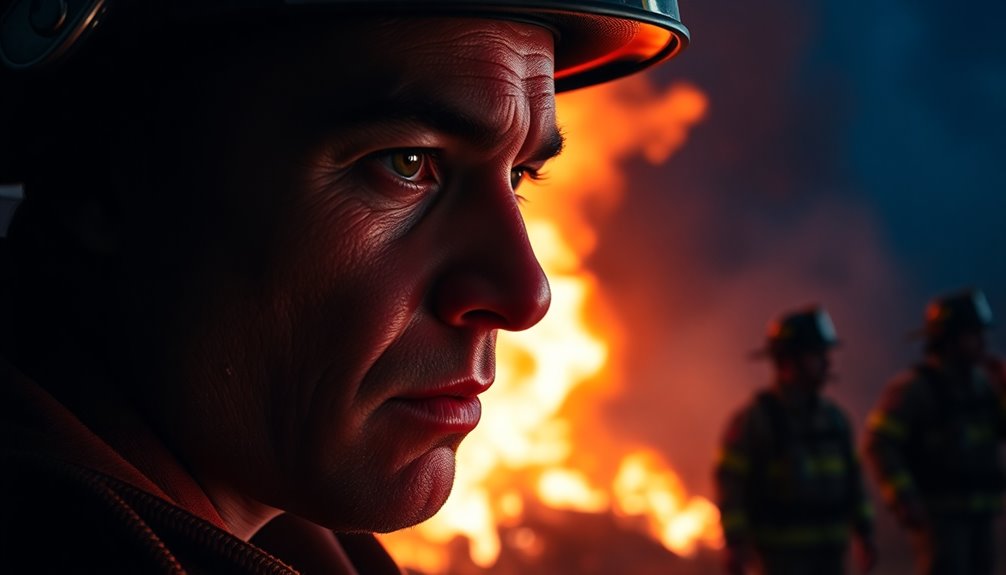When preparing for a firefighter interview, you're likely to face questions about your motivation, experience, and daily responsibilities. Expect inquiries about your commitment to community service and teamwork, as well as your problem-solving abilities. Interviewers may want to know how you handle emergency situations and maintain physical fitness. They'll assess your understanding of community involvement and fire safety education. Also, be ready to discuss how you manage stress. These questions help reveal your readiness for the challenges ahead. To uncover even more essential insights, you'll want to keep exploring the key topics that interviewers focus on.
Key Takeaways
- Discuss your motivation for firefighting, emphasizing community service and the desire to make a difference in people's lives.
- Highlight your experience, including any volunteer firefighting roles and relevant certifications like CPR and first aid.
- Provide examples of how you've faced challenges, showcasing resilience and growth in high-pressure situations.
- Demonstrate your understanding of the daily responsibilities of a firefighter, such as training, equipment maintenance, and community education.
- Emphasize essential qualities like teamwork, communication skills, and flexibility in adapting to emergency scenarios.
General Interview Questions
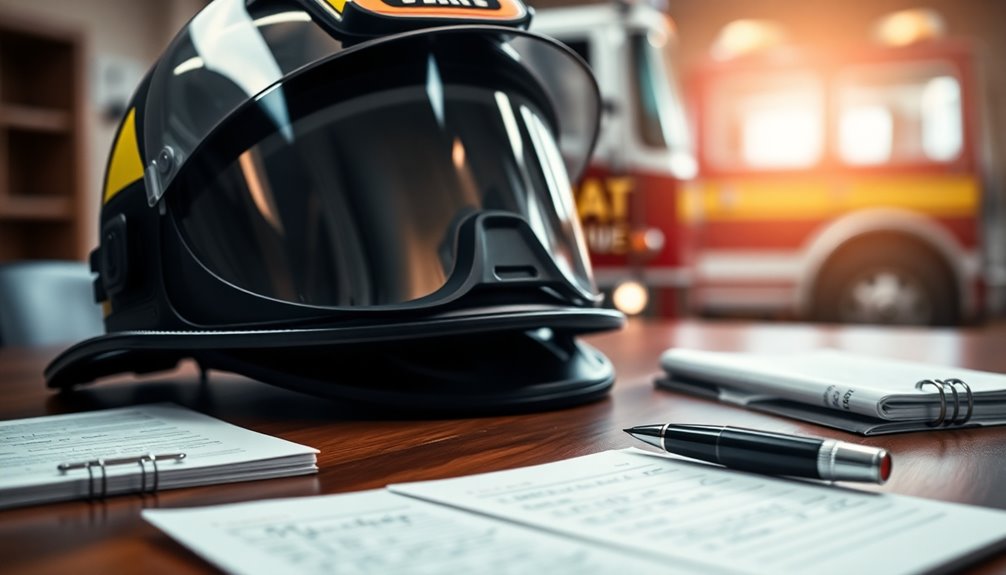
What motivates you to pursue a career as a firefighter? You likely feel a deep sense of duty to protect your community and help those in need.
This job isn't just about fighting fires; it's about making a real difference in people's lives. You probably thrive on the adrenaline of emergency situations and the camaraderie that forms within a firefighting team.
You'll want to convey your passion for the role during interviews, emphasizing qualities like dedication, teamwork, and resilience. Reflecting on personal experiences can also deepen your motivation; perhaps a moment inspired you to take this path.
Ultimately, your commitment to service and desire to be a local hero can shine through in your responses, showcasing why you're a perfect fit for the role.
Experience and Background Insights
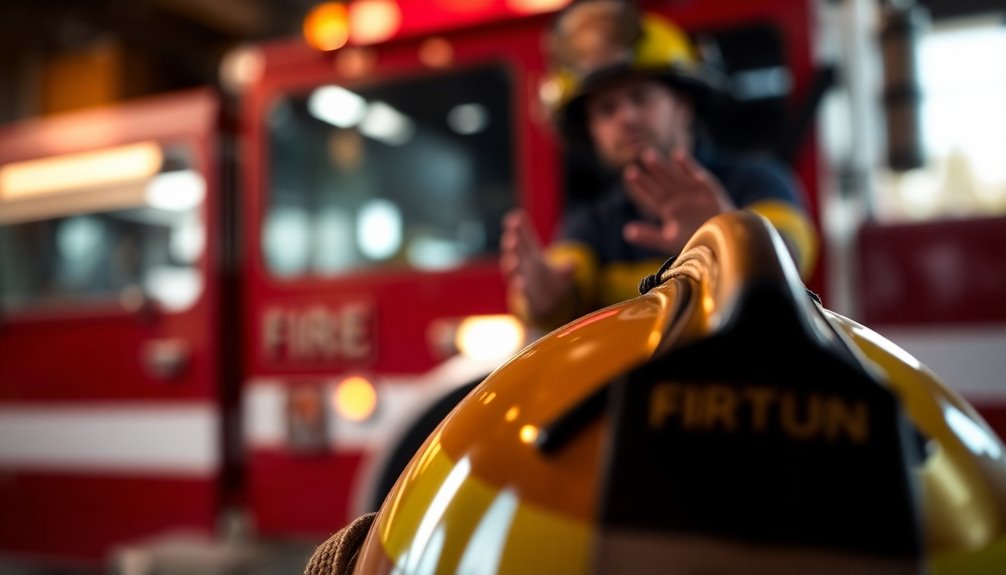
Your experiences and background play a significant role in shaping your qualifications for a firefighting position. When discussing your professional history, highlight any public service roles you've held, as they demonstrate your commitment to community safety.
If you've volunteered as a firefighter, share those experiences to showcase your dedication and training. Relevant certifications like CPR and first aid are also essential; be sure to mention them.
Reflect on any challenges you've faced and the lessons learned from your greatest failures, as this shows resilience and growth.
Finally, emphasize your commitment to physical fitness, as maintaining health is critical in this demanding role. These insights paint a clearer picture of your readiness and suitability for the firefighting profession.
Daily Responsibilities Overview

Daily, firefighters engage in a variety of responsibilities that guarantee they're prepared for emergencies.
These tasks guarantee they maintain readiness while serving their communities effectively.
Here's what you can expect in a typical day:
- Training and skill enhancement: Regular drills keep your skills sharp.
- Equipment maintenance and readiness: You check and maintain tools for safety.
- Community service and public education: Engaging with locals promotes fire safety awareness.
- Emergency response readiness: Staying alert for alarms and preparing for quick deployment is essential.
- Collaboration within the firehouse team: Working together fosters a strong, efficient unit.
Essential Qualities and Skills
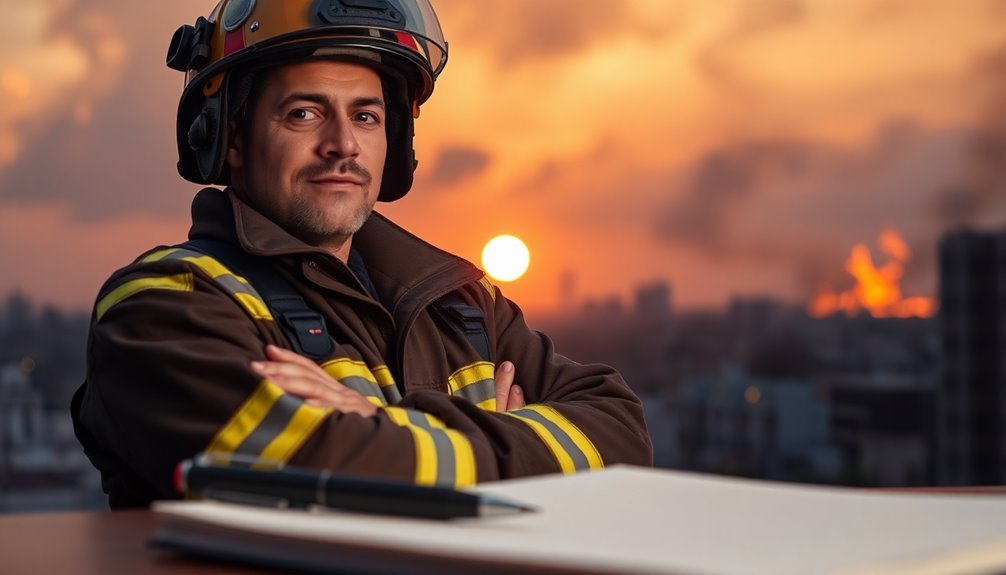
In firefighting, possessing essential qualities and skills is fundamental for success. You need dedication to your team and community, as collaboration is key in emergency situations.
Strong communication skills help you convey information clearly, ensuring everyone works together effectively. Flexibility allows you to adapt to various scenarios, while physical fitness keeps you prepared for the demands of the job.
Integrity and problem-solving skills are imperative for making quick decisions under pressure. Additionally, managing stress and maintaining mental health support are important to handle the emotional challenges of the role.
Community Involvement Importance
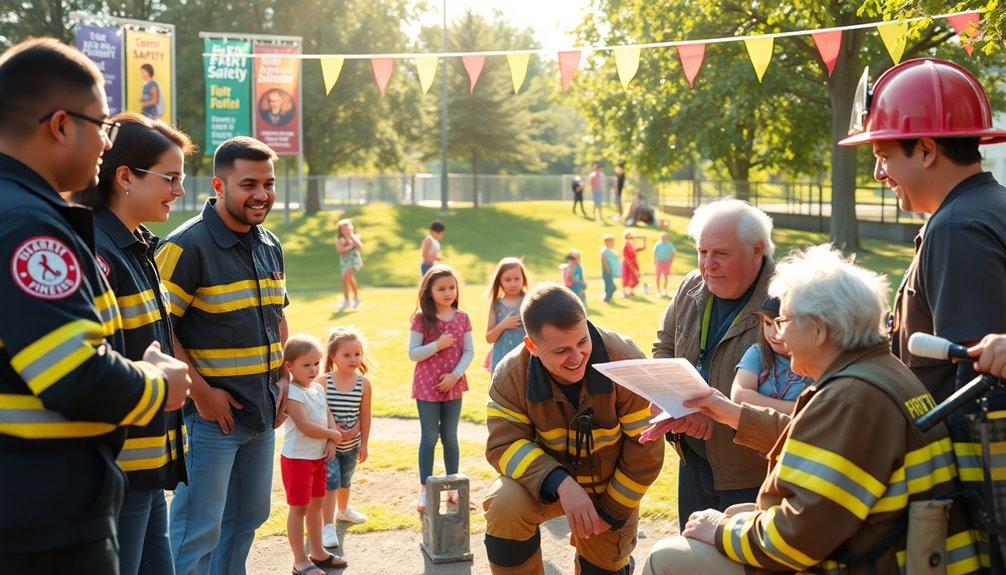
Community involvement plays an essential role in shaping the effectiveness of firefighters. When you engage with your community, you build trust and foster relationships that enhance public safety. Your role extends beyond emergency response; it's about education and support.
Here are key aspects of community involvement:
- Understanding local needs: Knowing demographics helps tailor safety programs.
- Fire safety education: Teaching fire prevention in schools can save lives.
- Participation in local events: Being visible strengthens community ties.
- Collaboration with organizations: Partnering with groups like Cub Scouts fosters youth engagement.
- Building rapport: Regular interactions create a supportive environment.
Teamwork and Collaboration Strategies
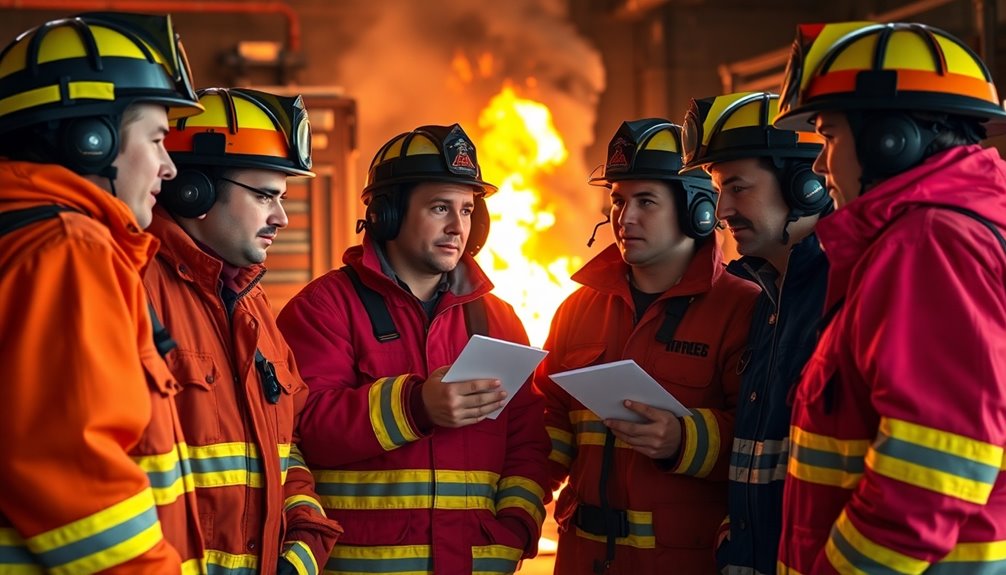
Effective teamwork and collaboration are essential for firefighters, as they directly impact safety and operational success.
You'll find that clear communication enhances effectiveness during emergencies. Trust among your team members is imperative; it guarantees everyone can rely on one another in high-pressure situations.
Leadership plays a significant role in fostering a collaborative environment, guiding team dynamics, and encouraging open dialogue.
After incidents, debriefing is important; it helps everyone reflect on performance and improve future teamwork.
Additionally, respect and understanding are key components of a strong team culture.
Conflict and Ethical Dilemmas

Conflict and ethical dilemmas are inevitable in high-pressure environments like firefighting.
You'll often face situations that test your integrity and decision-making skills. Being prepared to navigate these challenges is essential for maintaining a strong team dynamic.
Consider the following strategies:
- Address unethical behavior promptly.
- Encourage open communication among your peers.
- Always verify facts before taking action.
- Utilize conflict resolution techniques effectively.
- Maintain your integrity, even under pressure.
Emergency Decision-Making Tactics
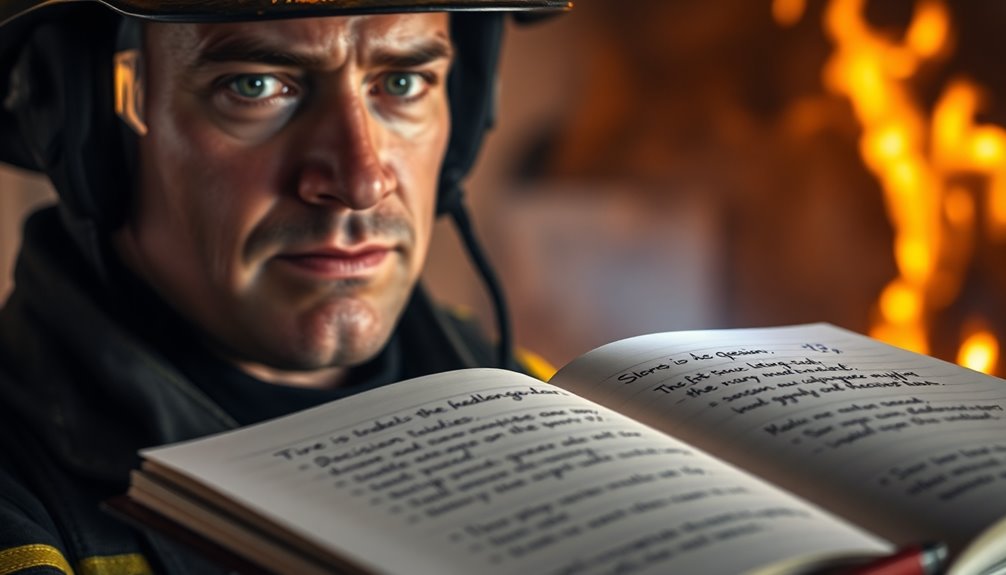
In high-pressure firefighting situations, quick and effective decision-making can mean the difference between life and death. You need to assess risks, balance protocols, and utilize your training to guide your responses. Here's a table to highlight essential tactics:
| Tactic | Description | Outcome |
|---|---|---|
| Situational Awareness | Evaluate the scene and assess dangers | Informed decisions |
| Team Collaboration | Discuss options with your team | Enhanced safety and efficiency |
| Prioritization of Actions | Focus on immediate threats first | Lives saved |
| Stress Management Techniques | Employ coping strategies on-site | Improved performance under pressure |
Future Career Considerations
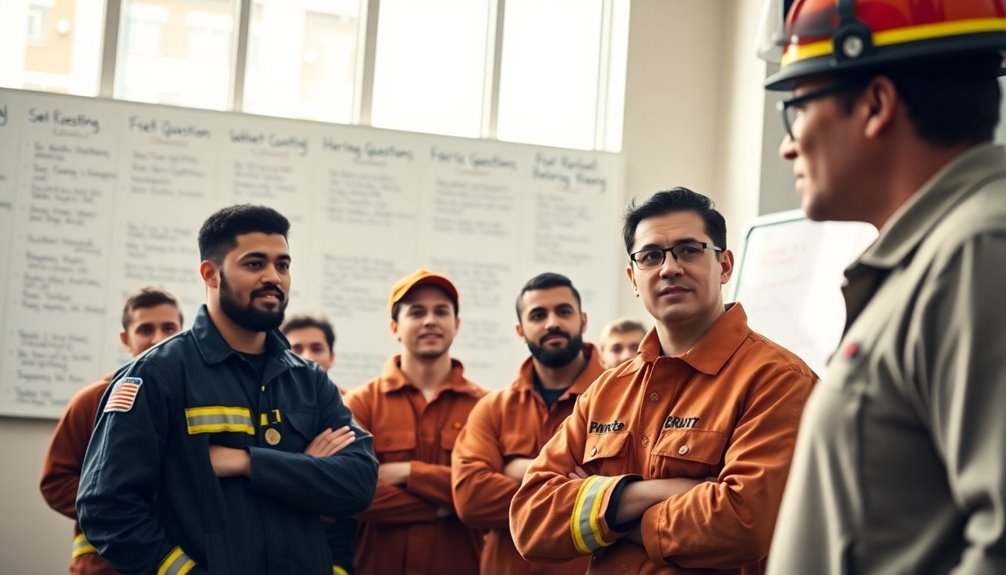
As you think about your future career as a firefighter, it's crucial to reflect on how emerging technologies and shifting community needs will shape your role.
Consider the following factors that may influence your career path:
- The integration of robotics and drones in firefighting operations.
- Advances in fire prevention technologies and strategies.
- Changes in community demographics and safety needs.
- The importance of ongoing training to adapt to new methods.
- The potential for leadership roles in evolving departments.
Physical Fitness Requirements
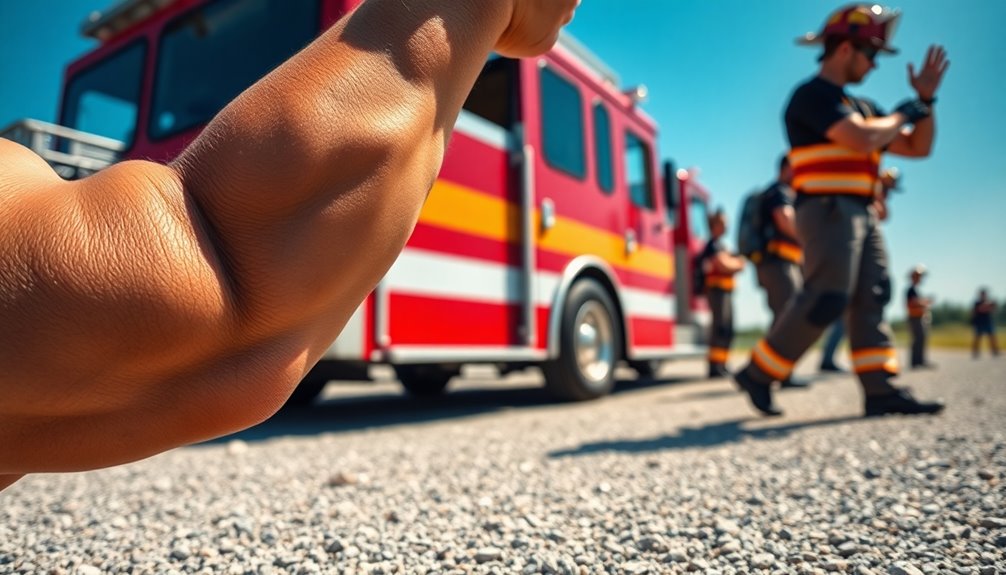
Considering the evolving landscape of firefighting, maintaining physical fitness is a key aspect of your role. Firefighting demands endurance, strength, and agility to handle the rigors of emergency situations.
You'll need to pass physical fitness tests that assess your ability to perform tasks like climbing ladders, carrying equipment, and maneuvering obstacles. Regular workouts focusing on cardiovascular health, strength training, and flexibility are essential.
Incorporating exercises like running, weightlifting, and high-intensity interval training can greatly enhance your performance. Nutrition also plays an important role in supporting your fitness goals.
Staying physically fit not only prepares you for the demands of the job but also reduces your risk of injury and boosts your overall well-being.
Frequently Asked Questions
How Do You Handle Criticism From Supervisors or Peers?
When you face criticism from supervisors or peers, it's crucial to stay calm and open-minded.
Listen carefully to their feedback and ask clarifying questions if needed. Reflect on the comments and identify areas for improvement.
You can also express gratitude for their insights, showing that you value their perspective.
Finally, take proactive steps to implement changes, demonstrating your commitment to growth and teamwork in your role as a firefighter.
What Motivates You During Challenging Firefighting Situations?
When you face challenging firefighting situations, your motivation often stems from the desire to protect lives and serve your community.
You draw strength from your training and the trust your team places in you. Remembering past successes can fuel your determination, helping you stay focused.
The bond you share with fellow firefighters also inspires you, as you work together to overcome obstacles and guarantee everyone returns home safely.
Describe Your Ideal Work Environment in a Fire Department
Your ideal work environment in a fire department balances intensity with camaraderie.
While the pressure of emergencies is high, the support from your team makes all the difference.
You thrive in a place where communication flows freely, fostering trust and respect.
You appreciate ongoing training, ensuring everyone's prepared for challenges.
A culture of encouragement and accountability not only enhances safety but also builds lasting relationships, making every shift rewarding and impactful.
How Do You Balance Work and Personal Life as a Firefighter?
Balancing work and personal life as a firefighter can be challenging, but it's essential. You can prioritize your time by creating a flexible schedule that accommodates both responsibilities.
Communicate with your family about your shifts and be present during your off time. Engage in activities that help you unwind, like exercise or hobbies.
What Personal Sacrifices Have You Made for This Career?
You've likely made several personal sacrifices for your firefighting career.
Maybe you've missed family gatherings, social events, or vacations due to unpredictable shifts. You might've put your hobbies on hold or dedicated countless hours to training and community service.
These sacrifices often lead to a deeper commitment to your role, reflecting your dedication to serving the community.
Ultimately, they shape your identity as a firefighter and strengthen your resolve in this challenging profession.
Conclusion
As you step into the interview room, visualize the vibrant flames of your passion for firefighting illuminating your path. Each question is a chance to showcase your skills, dedication, and heart for the community. With every answer, let your enthusiasm shine brighter, like a beacon in the night. Embrace the rhythm of the conversation, and remember: you're not just sharing your story; you're igniting a connection that could lead you to a fulfilling career in the fire service.
